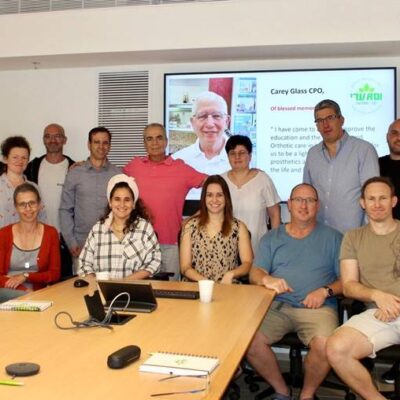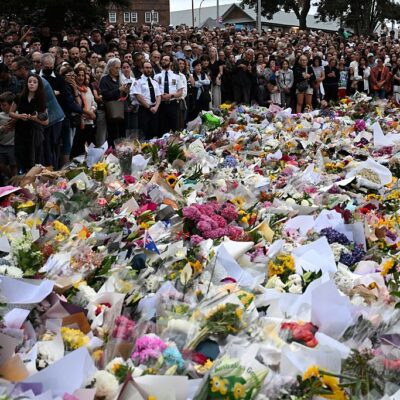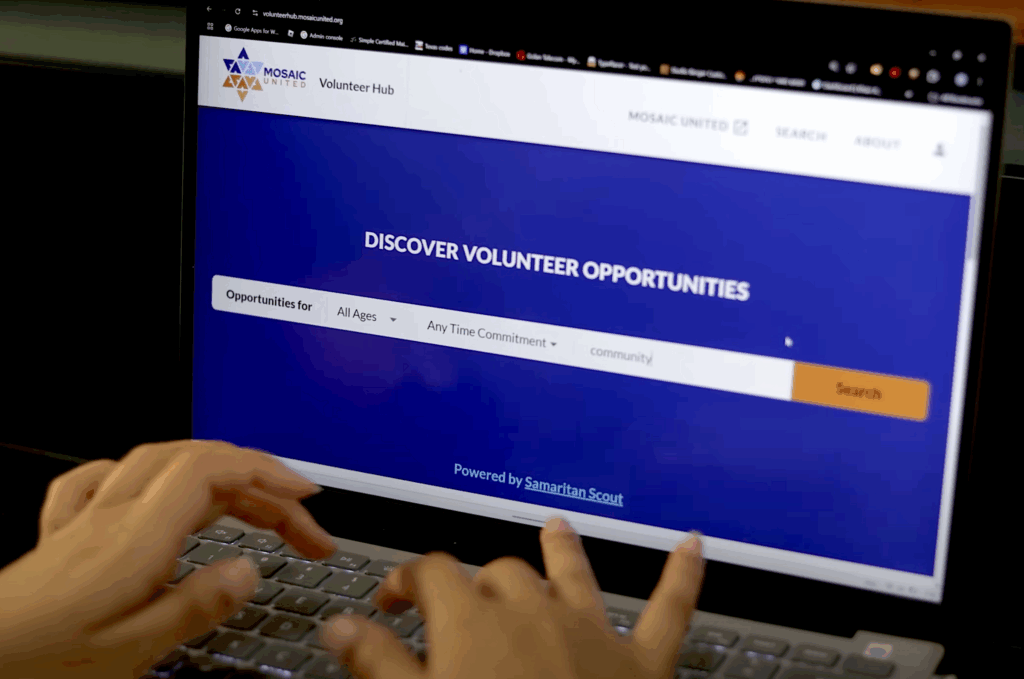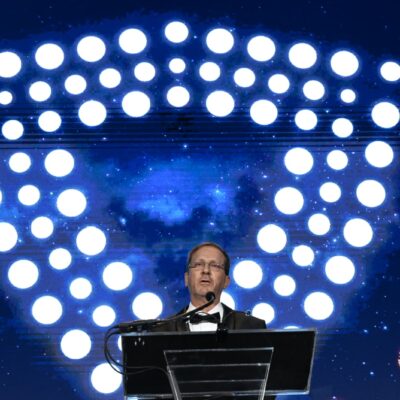Your Daily Phil: Divisions emerge among U.S. Jewry as Israel-Hamas war drags on
Good Thursday morning.
In today’s edition of Your Daily Phil, we report on emerging divisions within the American Jewish community over Israel advocacy nine months into the Israel-Hamas war. We feature an opinion piece by Steven Windmueller about the Hebrew Union College – Jewish Institute of Religion’s decision to now accept rabbinic students in interfaith relationships, and one by Jenna Hanauer and Rachel Shamash Schneider on the art of planning and hosting an impactful team retreat. Also in this newsletter: Lewis Katz, Liesel Pritzker Simmons and Roman Soibelis. We’ll start with a $9 million donation by the Tepper Foundation toward Jewish institutions’ security.
As antisemitic incidents continue to rise in the U.S., the Tepper Foundation has focused on advancing security for early childhood programs such as preschools, day camps and after-school programs. The foundation announced yesterday that it would expand its protection initiatives for young children and families by issuing $9 million to 76 local federations that have established security plans under the auspices of Jewish Federations of North America, reports eJewishPhilanthropy’s Haley Cohen.
The grant comes on the heels of one in January, in which the foundation provided $2.5 million in emergency grants through its Security Fund to underwrite the cost of security personnel in Jewish institutions where young children are in attendance. The Security Fund was launched by the foundation in November with an initial seeding of $2 million. Its first allocation was a $500,000 grant to Hillel International, which Hillel matched to provide $1 million toward increased security on college campuses.
“Right now, nothing is more important than protecting our children and giving them a safe environment where they can learn, grow and thrive as people,” Julie Platt, JFNA chair, said in a statement.
Randi Tepper, CEO of the New Jersey-based foundation, said that the $9 million comes as a response to “listening closely to the needs of our grantee partners” since the launch of the Security Fund. “We’re eager to get more dollars out the door to not only protect Jewish communities, but expand interfaith dialogue and coordination,” Tepper said in a statement.
“As we work to keep the Jewish community safe at this challenging time, we also have an important opportunity to provide leadership and partnership to other communities who are grappling with similar security challenges,” she said.
DIVIDING LINES
As Hamas war drags on, post-Oct. 7 Jewish communal unity fades as divisions over Israel advocacy emerge

In the immediate aftermath of the Oct. 7 terror attacks, the American Jewish community experienced a level of cohesion that it had not seen in decades. With exceedingly few exceptions, Jewish organizations from across the political and religious spectrum — from AIPAC to J Street, from the Union for Reform Judaism to Agudath Israel of America — came together in solidarity with Israel and support for the start of its war against Hamas in Gaza. But nine months on, the divisions between many of these organizations are beginning to show, as different segments of the Jewish community develop and express their own vision for what should come next, reports eJewishPhilanthropy’s Judah Ari Gross.
Red lines: Writing in the latest issue of the Orthodox Union’s magazine, its CEO, Rabbi Moshe Hauer, laid out the organization’s red lines that would render a group ineligible as an advocacy partner: seeking harm to Jews; not prioritizing Jewish self-defense; seeming more ashamed than proud of Israel; and failing to “unconditionally support the existence and defense of Israel even when critiquing it.” Hauer insisted that his circumscription was not meant to define what is or isn’t a legitimate belief about Zionism or to put any group in herem (excommunication), but was instead meant to signify the OU’s foundational values for advocacy work.“Of course, everybody has the right to their opinion,” he told eJP. “That’s fine, but that doesn’t make them my partner.”
Not like them: Yet Rabbi Rick Jacobs, president of the URJ, who had read Hauer’s piece, told eJP that he balked at the article by the OU leader, whom he said he considers a “wonderful colleague and a friend.” Specifically, Jacobs said that he took great issue with Hauer grouping his organization together with Rabbis for Ceasefire, whom he said has a markedly different views of Israel and Zionism — negative ones, generally speaking — than the Reform movement, which he said is an explicitly Zionist organization. “We have never called for conditioning military aid [to Israel]. We have been filled with empathy and solidarity and activism on behalf of Israel,” he said.
Common ground or effective messaging?: While Jacobs acknowledged that Hauer was not saying that the URJ’s viewpoints on Israel are illegitimate, he questioned the utility of drawing dividing lines in such a way that the Reform movement would not be considered a reliable partner as it relates to Israel advocacy. “I just think this is a moment in which the Jewish community would be helped and strengthened if we didn’t just categorize along ‘those issues’ or ‘those sides,’ and we found the common ground,” he said. Hauer said that his decision to pen the article and list these red lines was a “proactive” measure to lay out how the OU would treat its Israel advocacy going forward. “We’re not in the habit of walking away from tables, but at tables where the partners are representing this kind of ambiguity, we know we’re going to be getting less done,” he said.
A HISTORY OF CHANGE
Hebrew Union College: Facing the future

“Institutions live not only with the realities that inform their decisions but also with the consequences. Hebrew Union College – Jewish Institute of Religion’s recent announcement that it will now admit students seeking rabbinic ordination who are in a relationship with non-Jewish partners most assuredly points to the complexities facing seminaries in this age,” writes Steven Windmueller, professor emeritus of Jewish communal studies at HUC’s Los Angeles campus, in an opinion piece for eJewishPhilanthropy.
Demographic reality: “Among the competing forces involved in HUC’s decision on interfaith couples are the changing composition of the Jewish marketplace and shifting demographic realities. According to the Pew Forum on Religion and Public Life, for example, nearly 37% of Americans are married to someone of a different faith. The Jewish community reflects these same patterns: About two-thirds of Jewish adults in the U.S. are either married (59%) or living with a partner (7%), and 42% of all currently married Jewish respondents indicated they have a non-Jewish spouse. Among those who have gotten married since 2010, 61% are intermarried.”
Personal Jewish engagement matters: “Some who are critical of how this decision has been framed point to a perceived lack of enthusiasm, noting the school’s expectations that students will demonstrate a commitment to ‘exclusive Jewish practice.’ I for one do not see this decision as being based, as one of the HUC’s critics has argued, ‘in fear, control and frankly, despair.’ I think the policy shift was prompted by people taking note of demographic and generational realities, and HUC remains fully committed to the proposition of its clergy demonstrating serious personal Jewish engagement… The training of clergy involves multiple layers of preparation and education. Elements of this process are deeply rooted within Jewish tradition and culture, and parts of a candidate’s maturation will be driven by that individual’s own personal connection to Judaism, one’s journey of religious and spiritual discovery and the experience of being a part of a rigorous and demanding learning experience.”
BEST PRACTICES
The art of the team retreat

“Planning a retreat for a professional team is an opportunity to create a space filled with meaning, where colleagues have a sense of belonging and each person feels they are at the center of the experience,” write Jenna Hanauer and Rachel Shamash Schneider, program officers at the Jim Joseph Foundation, in an opinion piece for eJewishPhilanthropy. “In the Jewish professional world, the need for this intentional gathering space feels more important than ever.”
Words of wisdom: “Priya Parker is an expert on this subject, writing about the ‘art of gathering’ and the intentionality required to do this well. She notes that ‘gatherings crackle and flourish when real thought goes into them, when (often invisible) structure is baked into them, and when a host has the curiosity, willingness and generosity of spirit to try.’ ‘Think of what you want to be different because you gathered,’ she advises, ‘and work backward from that outcome.’”
What we learned: “As program officers at the Jim Joseph Foundation, we were asked to plan a series of retreats for the foundation’s program team. After doing some research on strategies and best practices, we had our first retreat in March; two others will occur later this year. While each retreat will cover different areas, we wanted the thematic throughline to connect to the foundation’s Strategic Road Map and the aspiration to help people find ‘connection, meaning and purpose.’ We learned a lot after planning the first retreat, and knowing that other organizations are also exploring ways to come together in this moment, we are sharing five insights inspired by Parker’s wisdom and our experience.”
Worthy Reads
The Worst Nine Months: The parents of four female hostages still believed to be alive in Gaza shared their fears for the fates of their daughters at a press conference on Tuesday, Nicole Lampert reports in The Jewish Chronicle. “They know their girls may have been sexually abused and tortured; they may not even still be alive. They’ve seen other hostages exchanged, and even rescued, but they have now come together to ask for a ceasefire deal that will bring their girls home. The parents of four of the young women still held hostage – Daniella Gilboa, Doron Steinbrecher, Agam Berger and Romi Gonen – spoke at a press conference on Tuesday night to say the world must not forget their plight. ‘Nine months is a symbolic time for a parent, normally a happy time, but my daughter is in the hands of terrorists who we know sexually abused and raped women and all I can think about is that this is a sad day for my daughter who may or may not be pregnant,’ said Orli Gilboa… [Simona Steinbrecher said:] ‘We know from the women who came back that there has been sex abuse and all of us are worried about what is happening to our girls, which is why we ask that everyone push Hamas to make a deal. This is the only chance we have to get our daughters back. There is no choice.” [JC]
Torchbearers: In Forward, Matthew Litman writes about the efforts of descendants of Holocaust survivors to keep their now-deceased relatives’ stories alive. “Joan Poulin paced the bima of Lincoln Park Jewish Center as she told the story. Her tone was urgent, almost severe, as she spoke to 100 teenagers about what it was like growing up in a well-off Jewish family in Hamburg, Germany, as the Nazis came to power; surviving Kristallnacht and then making the wrenching decision to leave her mother and brother behind in 1938 and flee to the United States… The presentation sounded like countless other Holocaust survivor testimonies, but Poulin is 66 — born long after the war, in 1957. The story she was telling was not her own but that of her father, who rarely spoke about his childhood in Europe. She pieced it together after he died in 2007 from a trove of letters he left behind in a language she did not understand; now she tells the story as often as possible. Poulin is one of 38 members of a community called Generations Forward, descendants of survivors who excavate their families’ trauma — and their own — for the public good. Run by the Holocaust and Human Rights Education Center, founded in 1990 by local community members and survivors in Westchester, it is part of a broader movement aimed at ensuring that Holocaust education and testimony continues as the number of survivors rapidly dwindles.” [Forward]
Read Deal Or Blowing Smoke?: In The Wall Street Journal, Scott Patterson and Amrith Ramkumar highlight the risk and uncertainty investors can choose to weather when they help fund the development of new technology promised to be environmentally friendly. “[Scientist Simon] Hodson was using advanced technology to turn waste coal into fertilizer and other products… The ‘quantum reformers’ he had designed, Hodson had said, could turn coal into clean-burning hydrogen — without emitting any greenhouse gases. And that hydrogen, Hodson said, could run old coal-fired power plants, something that had never been done before… Soon after that visit in September 2022, [motivational speaker and entrepreneur Tony] Robbins lent Hodson nearly $200 million to develop the potentially breakthrough technology. That amounted to the largest single wager he has ever made. Together, the two men took over a defunct coal-fired power plant in West Virginia and set out to prove their revolutionary idea will actually work… [Hodson’s company,] Omnis, which said earlier this year it would begin doing business under the name Omnigen, ticks a lot of boxes for a clean-energy startup. The technology it has trumpeted appeals to both sides of the political spectrum by promising to eliminate emissions while using fossil fuels, thereby saving jobs in a threatened industry… Robbins said all doubts will vanish once the company successfully demonstrates the technology. Hodson, he said, is either ‘the best con man in the world… or one of the smartest guys.’” [WSJ]
Around the Web
A new poll of 8,000 European Jews by the EU’s Agency for Fundamental Rights found that 96% had experienced antisemitism in the year prior to being surveyed, with only 18% of respondents saying that their governments are appropriately addressing the issue…
On a private Zoom call, a representative of the Biden campaign faced questions and concerns from members of Jewish Women for Joe about the president’s ability to defeat presumed Republican nominee Donald Trump and effectively serve another term in office…
The Jewish Community Center in Margate, N.J., which has been known as the Milton & Betty Katz JCC, is being rededicated in honor of Lewis Katz, a philanthropist and former co-owner of the Philadelphia Inquirer, who died in 2014. It will be renamed the Marjorie & Lewis Katz JCC…
R&R: The Rest of our Lives announced the 15 recipients of its new Breakweek program, which provides a grant and other support to Jewish nonprofits to shut down for a week…
The Financial Times spotlights the philanthropists and nonprofits that are working to shore up democratic norms in the United States, notably Liesel Pritzker Simmons…
Alex Soros, the son of George Soros and recently installed board chair of the Open Society Foundations, got engaged to Huma Abedin, a former top aide to Hillary Clinton…
The Jewish Community Relations Council of Silicon Valley, Calif., merged with the larger, nearby JCRC of the Bay Area…
The Alpha Epsilon Pi fraternity launched a new partnership with Mothers Against College Antisemitism with grants, scholarship opportunities and resources for parents and to combat antisemitism on university campuses…
Local Jewish leaders expressed “disappointment” with Harvard University’s decision to reverse the suspensions of five students who participated in anti-Israel encampments earlier this year…
The Forward profiles Roman Soibelis, a mainstay of the Moldovan Jewish community…
Mordechai Rosenstein, an Elkins Park, Pa.-based Jewish artist, whose work focused on Hebrew calligraphy, died on Tuesday at 90…
Vivian (Simkins) Lasko, a Philadelphia-focused philanthropist who was also from Elkins Park, died on Monday at 94…
Pic of the Day

Prime Minister Benjamin Netanyahu met with 30 Chabad on Campus rabbis from around the world in Jerusalem on Tuesday, the 30th yahrzeit of the Lubavitcher Rebbe, Menachem Mendel Schneerson. They discussed challenges facing the Jewish nation worldwide and specifically those facing students on college campuses. The Israeli government’s cabinet secretary, Yossi Fuchs, and Rabbi Moshe Shilat, director of Chabad on Campus Israel, also attended the meeting.
Chabad on Campus International’s annual conference is usually held in New Jersey, but it was happening in Israel this year to show support for Israelis and experience the situation in the country firsthand. The conference drew 200 Chabad shlichim (emissaries), who are dealing with the fallout of Oct. 7 in the form of surging antisemitism on the campuses where they live and work.
Birthdays

Actress, she portrayed Frau Farbissina in the “Austin Powers” film series, Mindy Lee Sterling…
Entrepreneur, investment banker, civil servant and political advisor, Stephen Berger… Developmental psychologist at Harvard, he was selected in the 1981 inaugural class of MacArthur genius fellows, Howard Gardner… Member of the U.K.’s House of Lords, he was PM Tony Blair’s special envoy to the Middle East for nine years, Baron Michael Abraham Levy… Sen. Ed Markey (D-MA)… EVP of the Milken Family Foundation and past chair of the Board of Trustees of JFNA, Richard V. Sandler… Journalist covering classical music, he is the author of Genius & Anxiety: How Jews Changed the World, 1847-1947, Norman Lebrecht… Founder in 1992 of Schnur Associates, she spent 12 years as executive director of the Greater New York Coalition for Soviet Jewry, Zeesy Schnur… West Orange, N.J., resident, Jeffrey Maas… Singer-songwriter, known by his stage name “RebbeSoul,” Bruce Burger… Founder and retired CEO of Sidewalk Labs, he was previously CEO of Bloomberg L.P., Daniel L. Doctoroff… Los Angeles-based Group executive vice president of public relations for Discovery Channel and Science Channel, Laurie Goldberg… Executive chairman of Aston Martin and the owner of the Aston Martin Formula 1 Team, Lawrence Stroll… Radiation oncologist at the Dana-Farber Cancer Institute and Brigham and Women’s Hospital, Harvey Jay Mamon, MD, Ph.D…. Managing member at Samuel Capital Management, Barry Mannis… Former member of the Knesset for the Likud party, Yaron Mazuz… Former commander of the IDF’s Southern Command, now in the IDF reserves, Maj. Gen. Shlomo “Sami” Turgeman… Judge of the U.S. Court of Appeals for the 11th Circuit since 2014, Judge Robin Stacie Rosenbaum… Retired tax attorney, she now bakes challahs on NYC’s UWS to benefit the UJA, Adina Tamar Spiro Wagman… Executive editor of The City, Alyssa A. Katz… Senior program and community engagement director at the Los Angeles-based Smidt Foundation, Lindsey Caren Kozberg… Consultant focused upon social impact strategies, Joshua D. Wachs… Actor, podcaster and lead singer of the band Sun Spin, Michael Owen Rosenbaum… Ukrainian-born computer scientist and entrepreneur, Max Levchin… Founder and CEO of Wisconsin-based Good Karma Brands, Craig Karmazin… Principal at Civitas Public Affairs Group, Celine Mizrahi… Chabad rabbi at Washington University in St. Louis, Rabbi Hershey Novack… Comedian, podcaster and political commentator, Katherine Rose “Katie” Halper… Screenwriter and executive producer, Theodore Beren Bressman… Retired ice hockey forward, Jacob Micflikier… Executive director of the New Democrat Coalition, Anne Sokolov… and her twin sister, a co-founder at Social Goods, Kate Sokolov… Retired offensive guard in the NFL for eight seasons, his Hebrew name is Gedalia Yitzhak, Geoff Schwartz… Senior deputy associate counsel in the White House Counsel’s office, Matthew J. Rosenbaum… Bryan Stone…


 Add EJP on Google
Add EJP on Google






